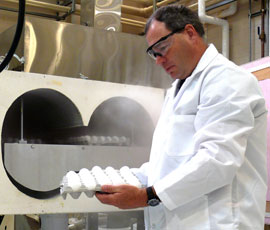Cooling freshly laid eggs can double shelf life

Taking a few minutes to cool freshly laid eggs can double their shelf life and reduce the risk of salmonella, according to a new study.
The rapid cooling process, developed by Kevin Keener, a professor of food science at Purdue University, Indiana, uses carbon dioxide to create a thin layer of ice inside the egg shell.
Prof Keener said although there was no difference in the egg white’s protein quality between eggs just after lay and those which were rapidly cooled, the process had been proven to significantly extend shelf life.
The process saw eggs placed in a cooling chamber where carbon dioxide gas was generated at -110 degrees to cool their internal temperature to below 45 degrees at which salmonella cannot grow.
“You could send eggs anywhere in the world if you could get even eight weeks of shelf life at AA quality. We’re seeing that at 12 weeks.”
Professor Kevin Keener
Traditionally eggs are more than 100 degrees when they’re packed and can take up to 142 hours – almost six days – to cool inside industrial refrigerators.
But, the new cooling process enables eggs to be cooled in a matter of minutes.
So far the process has proven so successful the eggs could be rated AA – the highest grade- for as long as 12 weeks.
Eggs cooled under current methods lose their AA rating in approximately six weeks, Prof Keener said.
Results also showed that yolk membranes – a barrier which keeps harmful bacteria from reaching the yolk – were maintained for 12 weeks.
“The structural integrity of the yolk membrane stays strong, longer, which may provide a food safety benefit and would be another defence against bacterial invasion, such as salmonella,” he said.
Rapid cooling would also enhance the ability to export eggs, explained Prof Keener.
“You could send eggs anywhere in the world if you could get even eight weeks of shelf life at AA quality. We’re seeing that at 12 weeks,” he added.
The report was first published in Poultry Science.
